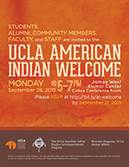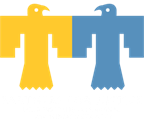Add 'aisclist@aisc.ucla.edu' to your address book to prevent emails from going to your junk folder.

Message from the Interim Director
Dear Friends of the UCLA American Indian Studies Center,
Welcome back to the start of a brand new year! As Interim Director of the Center, I have learned much in these few short months and as the regular school year ramps up I am sure there will be much more information to digest. Please bear with us in this transitional moment. I look forward to talking more with you all about the center and hearing your thoughts. It is an honor to be able to serve you all and to keep the seat warm while we wait for our new director.
I am excited that this year the students, alumni, faculty, staff and community members will have a dinner together at the start of the year. We have a great crew organizing the event with returning and new members of the community. As in the past, we will introduce the different organizations that keep UCLA proactive in our education efforts. We have also introduced new components to the dinner so we can learn and meet each other across the often too disparate arms of the university. We will also distribute a calendar, so please let us know if you are sponsoring a talk or gathering you would like to include. It will be an event you don’t want to miss!
Our fall is filled with exciting events so far! In late October, we are lucky to be visited by Indigenous players from the National Rugby League and professor Roannie Ng Shiu of ANU (in a partnership with the Pasifika outreach program of the Australian National University). Many of you who know me, know my love of rugby, so I am truly excited to collaborate with this outreach mission. We will have a lunch and noon panel on Sports and Indigeneity. We will again be co-sponsoring the Sundance film event at the Autry. The event will be in the first week of November, so stay tuned to hear about the selection. Please come out and support Native filmmakers and meet the wider American Indian community in Los Angeles!
We will also have a panel on the environment and Indigenous geographies in late fall. Here you will get a chance to meet our UC President’s Post-doctoral scholar, Iokepa Casambul-Salazar (Native Hawaiian) who will speak on activism to protect the sacred Mauna Kea site. In the fall, Visiting Indigenous Sami scholar and activist, May-Britt Ohman (Sami) will also be in residence. Ford Post-doctoral scholar Christina DeLisle (Chamorro), who does work on militarism, land, and gender issues in Guam will also be part of our community. We are lucky to have these impressive scholars who speak so clearly and passionately to the importance of sacred sites, the land and our responsibility to community.
Also in the first week of December, Canadian researcher Sherene Razack, will be on campus and giving a public lecture. Her new book, Dying From Improvement: Inquests and Inquiries into Indigenous Deaths in Custody, is timely and of upmost importance to Indigenous communities who face mass incarceration. As we move into the Winter quarter, we will be collaborating with Repair, a local non-profit that provides resources for “healing, health, and disability in a way that makes the most sense to those who care deeply about social justice.” We will co-sponsor talks in February and March, that will engage with disability, aging, elder care and Indigenous communities, featuring Sandy Grande and Juliann Anesi (Samoan). This is part of a continuing education class that will be offered to practioners from health, law, education and social work. As the schedule becomes confirmed, we will make sure to let you all know where to find more information. These are just a few of the activities we have been fortunate enough to help plan. We look very forward to hearing from you all and helping in whatever way we can!
Although in transition, the Center promises to continue promoting important research, making available sources for communities and providing a place for important conversations. Come join us!
Mishuana Goeman (Tonawanda Band of Seneca)
Interim Director, UCLA American Indian Studies Center
Vice Chair and Associate Professor, UCLA Department of Gender Studies
Save the Date: UCLA American Indian Welcome
 Students, Alumni, Community Members, Faculty, and Staff are invited to the UCLA American Indian Welcome.
Students, Alumni, Community Members, Faculty, and Staff are invited to the UCLA American Indian Welcome.
Monday, September 28, 2015
5 – 7 PM
James West Alumni Center, Collins Conference Room
Please RSVP at http://bit.ly/ai-welcome by September 21, 2015.
Hosted and sponsored by the UCLA American Indian Studies Center, American Indian Student Association, the UCLA American Indian Studies Interdepartmental Program, and Diversity Programs, UCLA Alumni Affairs.
Stay Connected with AISC
|
® All Rights Reserved. © UCLA American Indian Studies Center
405 Hilgard Ave., 3220 Campbell Hall, Box 951548, Los Angeles, CA 90095-1548
310.825-7315 | www.aisc.ucla.edu | aisc@ucla.edu

